Nucor Bundle
Who Really Controls Nucor Corporation?
Understanding the ownership structure of a company is crucial for grasping its strategic direction and market influence. Nucor Corporation, a titan in the steel industry, has an intriguing history that has shaped its current status as a leader in North America. From its origins to its present-day prominence, Nucor's evolution offers valuable insights into how ownership dynamics impact corporate success.
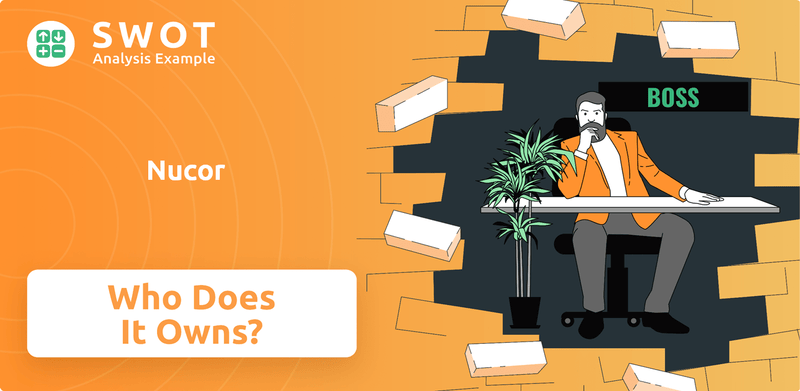
This deep dive into Nucor SWOT Analysis will explore the evolution of Nucor's ownership, from its early days to its current status as a publicly traded entity. We'll uncover who owns Nucor, examining the influence of major shareholders, institutional investors, and the impact of these stakeholders on the company's governance and strategic decisions. Discover how the Nucor company ownership structure has evolved and its implications for investors and industry watchers alike.
Who Founded Nucor?
The story of Nucor's ownership begins with the transformation of the REO Motor Car Company, evolving significantly with the emergence of Nuclear Corporation of America in 1955. The true architects of the modern steel giant, Nucor Corporation, were F. Kenneth Iverson, who became president in 1965, along with Samuel Siegel (CFO) and David Aycock (President post-Iverson). Iverson's leadership was pivotal in steering the company away from near bankruptcy in the mid-1960s.
Iverson's vision centered on the profitable Vulcraft joist manufacturing operations and strategic vertical integration through the construction of mini-mills to supply steel. This shift was financed through the divestiture of other divisions and prudent capital management, rather than traditional startup funding. This approach set the stage for Nucor's future success, emphasizing efficiency and a decentralized structure.
In 1962, F. Kenneth Iverson, a mechanical engineer, took the helm as general manager of Nuclear Corporation's Vulcraft division in Florence, South Carolina. Vulcraft, specializing in steel joists and girders, was the only profitable division. In 1966, Iverson committed to the steel joist industry, relocating the corporate headquarters to Charlotte, North Carolina. Under his initial management, Nuclear's net sales rose from $21 million to $35 million, largely due to Vulcraft's dominant 20% share of the joist market.
F. Kenneth Iverson's leadership was crucial in transforming the company.
The focus shifted to the profitable Vulcraft division and steel joist manufacturing.
Funding came from divesting other divisions and smart capital management.
The first mini-mill began production in Darlington, South Carolina, in 1969.
The company officially changed its name to Nucor Corporation in 1972.
Early agreements and capital reflected Iverson's vision of efficiency.
The early ownership of Nucor was significantly shaped by the leadership of F. Kenneth Iverson and his strategic decisions. The company's focus on steel joists and the establishment of mini-mills were pivotal in its growth. As of late 2024, Nucor's market capitalization is approximately $40 billion, reflecting its strong financial performance and the success of its early strategic decisions. The company's commitment to a decentralized, efficient structure, as envisioned by Iverson, has played a crucial role in its long-term success and is still a key aspect of how the company operates today. The early focus on internal capital management and strategic investments laid the groundwork for Nucor's current status as a major player in the steel industry, with a significant impact on its stakeholders and the broader market.
Nucor SWOT Analysis
- Complete SWOT Breakdown
- Fully Customizable
- Editable in Excel & Word
- Professional Formatting
- Investor-Ready Format
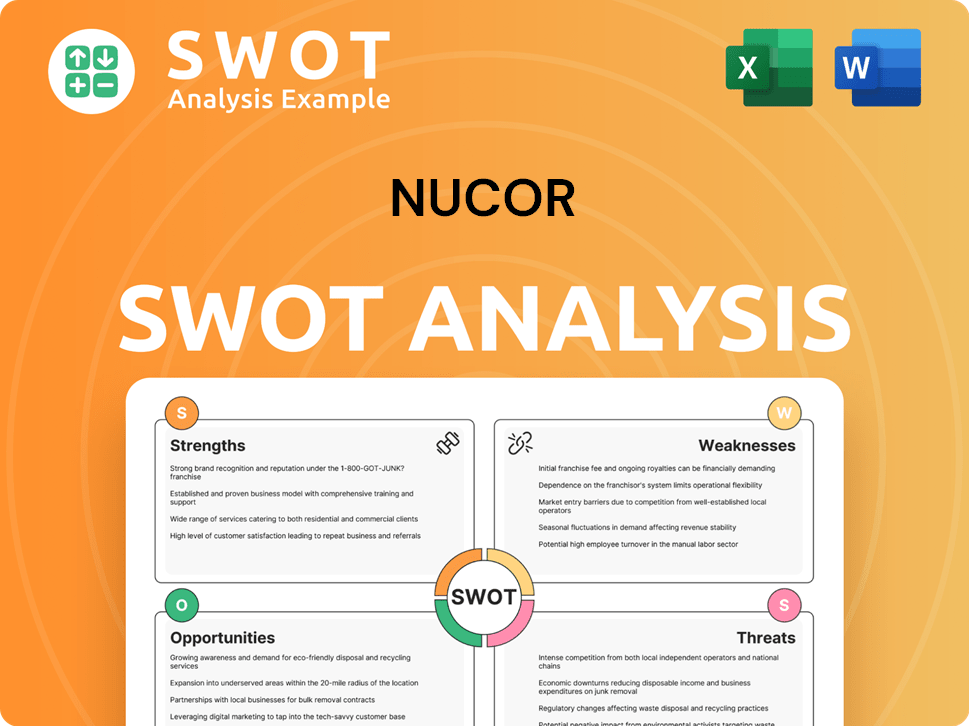
How Has Nucor’s Ownership Changed Over Time?
Nucor Corporation, a leading steel producer, operates as a publicly traded company, meaning its ownership is distributed among various shareholders. This structure, with its stock listed on the New York Stock Exchange (NYSE) under the ticker symbol NUE, signifies that a diverse group of investors holds its shares. These include institutional investors, mutual funds, exchange-traded funds (ETFs), investment advisors, and individual shareholders. Understanding the Nucor ownership structure is key to grasping its operational dynamics and strategic direction.
The ownership of Nucor company is primarily divided between institutional investors, insiders, and the general public. As of the latest data, institutional investors hold approximately 65.13% of the stock, while insiders own about 0.69%. The remaining shares are held by public companies and individual investors, accounting for around 34.18%. This distribution highlights the significant influence of institutional investors on the company's decisions, given their majority stake. For those interested in learning more about the company's origins, a Brief History of Nucor provides valuable context.
| Shareholder Type | Percentage of Ownership | Details |
|---|---|---|
| Institutional Investors | ~65.13% | Includes mutual funds, ETFs, and investment advisors. Holds significant influence. |
| Insiders | ~0.69% | Includes Nucor executives and board members. |
| Public & Individual Investors | ~34.18% | Comprises individual shareholders and other public entities. |
Key events, such as acquisitions, have significantly impacted Nucor's ownership structure. The company has completed numerous acquisitions to expand its market presence and capabilities. Recent notable acquisitions include Rytec Corporation for $565 million in June 2024, Southwest Data Products for $115 million in April 2024, and C.H.I. Overhead Door for $3 billion in May 2022. These strategic moves have expanded Nucor's operations in construction products, steel fabrication, and raw materials, strengthening its supply chain and market reach.
The Vanguard Group Inc. holds a substantial stake in Nucor, approximately 12% of outstanding shares. State Farm Mutual Automobile Insurance Co. holds 11%, and BlackRock, Inc. holds 8.9%. These institutional investors play a crucial role in shaping the company's strategic direction.
- Vanguard Group Inc. (12%)
- State Farm Mutual Automobile Insurance Co. (11%)
- BlackRock, Inc. (8.9%)
- Recent acquisitions include Rytec Corporation (2024) and C.H.I. Overhead Door (2022).
Nucor PESTLE Analysis
- Covers All 6 PESTLE Categories
- No Research Needed – Save Hours of Work
- Built by Experts, Trusted by Consultants
- Instant Download, Ready to Use
- 100% Editable, Fully Customizable
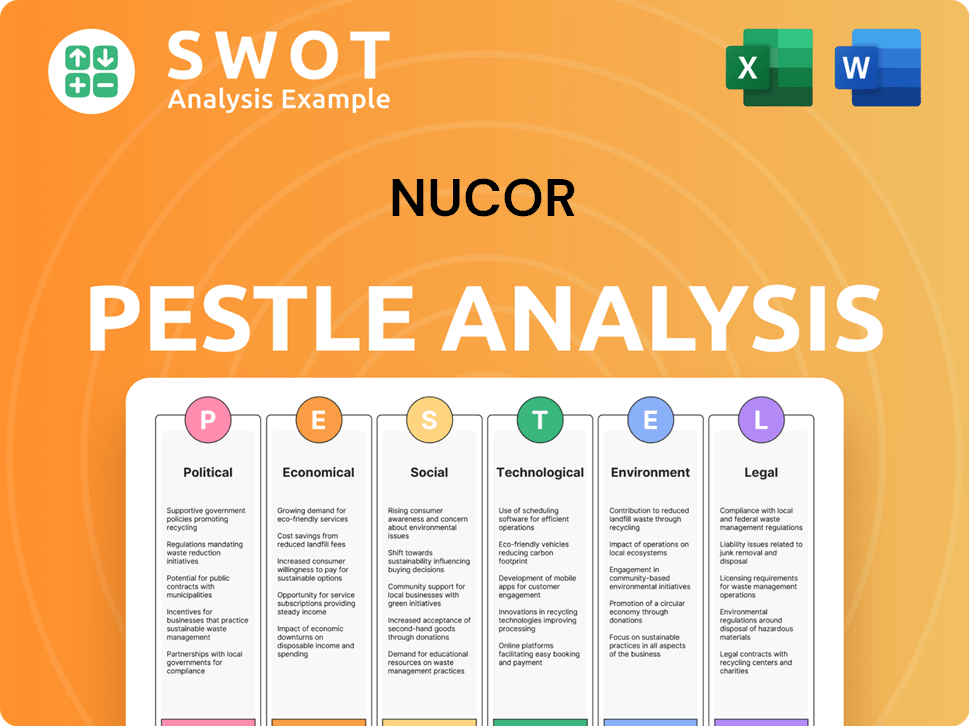
Who Sits on Nucor’s Board?
The Board of Directors at Nucor Corporation is pivotal in overseeing the company's strategy and governance. The board operates under a classified structure, with directors serving staggered three-year terms. This setup ensures continuity, as only a portion of the board is up for election each year. Directors are elected at the annual meetings, and they remain in their positions until their successors are duly elected and qualified. The Corporate Governance Principles of Nucor require that any director who receives more 'withhold' votes than 'for' votes in an uncontested election must offer their resignation for the board's consideration.
As of March 2024, several board members, including Ms. Haynes and Messrs. Browning, Daley, Gantt, Hlavacek, Milchovich, and Waltermire, have been identified as 'independent' based on the NYSE's listing standards. This designation indicates that these directors have no material relationships with Nucor beyond their directorship. For detailed insights into the company's governance and board composition, the 2024 annual report (Form 10-K filed February 27, 2025) and the Q1 2025 quarterly report (Form 10-Q filed May 14, 2025) are the most current sources of information.
| Board Member | Title | Independent Status (March 2024) |
|---|---|---|
| Ms. Haynes | Director | Yes |
| Mr. Browning | Director | Yes |
| Mr. Daley | Director | Yes |
| Mr. Gantt | Director | Yes |
| Mr. Hlavacek | Director | Yes |
| Mr. Milchovich | Director | Yes |
| Mr. Waltermire | Director | Yes |
Nucor's common stock, traded on the New York Stock Exchange under the symbol 'NUE,' grants each outstanding share one vote on matters brought before stockholders. However, for director elections, cumulative voting rights apply. This means that shareholders can cast a number of votes equal to the number of director nominees multiplied by the number of shares they own. These votes can be concentrated on a single nominee or distributed among multiple candidates, offering minority shareholders a greater influence in director elections. If you want to understand the Target Market of Nucor, you can find more information.
The Board of Directors at Nucor plays a crucial role in governance and strategic oversight.
- Directors serve staggered three-year terms.
- Independent directors are identified based on NYSE standards.
- Cumulative voting allows minority shareholders more influence.
- Recent filings provide the most current ownership details.
Nucor Business Model Canvas
- Complete 9-Block Business Model Canvas
- Effortlessly Communicate Your Business Strategy
- Investor-Ready BMC Format
- 100% Editable and Customizable
- Clear and Structured Layout
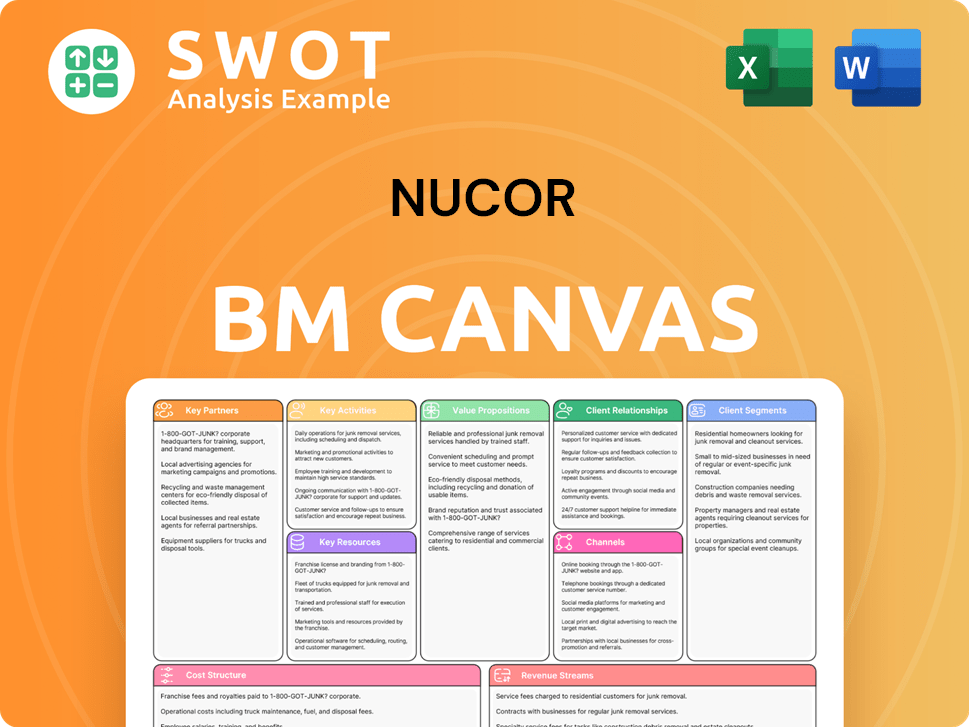
What Recent Changes Have Shaped Nucor’s Ownership Landscape?
Over the past few years, Nucor Corporation has shown active capital management and strategic expansion. In the first quarter of 2025, the company repurchased approximately 2.3 million shares of its common stock. For the full year 2024, Nucor returned approximately $2.73 billion in capital to stockholders through dividends and share repurchases, with share buybacks amounting to $2.22 billion.
Nucor has also been involved in strategic acquisitions. In 2024, the company made two acquisitions, including Rytec Corporation for $565 million and Southwest Data Products for $115 million. These moves have helped Nucor expand beyond its core steelmaking business. Industry trends show an increase in institutional ownership, with approximately 65.13% of Nucor's stock held by institutional investors.
While Nucor's financial performance in 2024 saw net earnings decrease to $2.03 billion from $4.53 billion in 2023, and net sales decrease to $30.73 billion from $34.71 billion in 2023, the company generated a strong cash flow of $4.0 billion in 2024. Nucor expects market conditions to improve in 2025, driven by steel-intensive megatrends in the U.S. economy. New bar mills in North Carolina and Arizona are expected to commence operations in the coming quarters of 2025.
Understanding Nucor ownership is crucial for investors and stakeholders. The majority of the company is held by institutional investors, indicating a strong level of confidence in the company's future. This ownership structure can influence strategic decisions and financial performance.
Major Nucor stakeholders include institutional investors, individual shareholders, and Nucor executives. The interests of these groups are often aligned with the company's success, leading to a focus on profitability and growth. Understanding who owns Nucor provides insight into its strategic direction.
Nucor Porter's Five Forces Analysis
- Covers All 5 Competitive Forces in Detail
- Structured for Consultants, Students, and Founders
- 100% Editable in Microsoft Word & Excel
- Instant Digital Download – Use Immediately
- Compatible with Mac & PC – Fully Unlocked
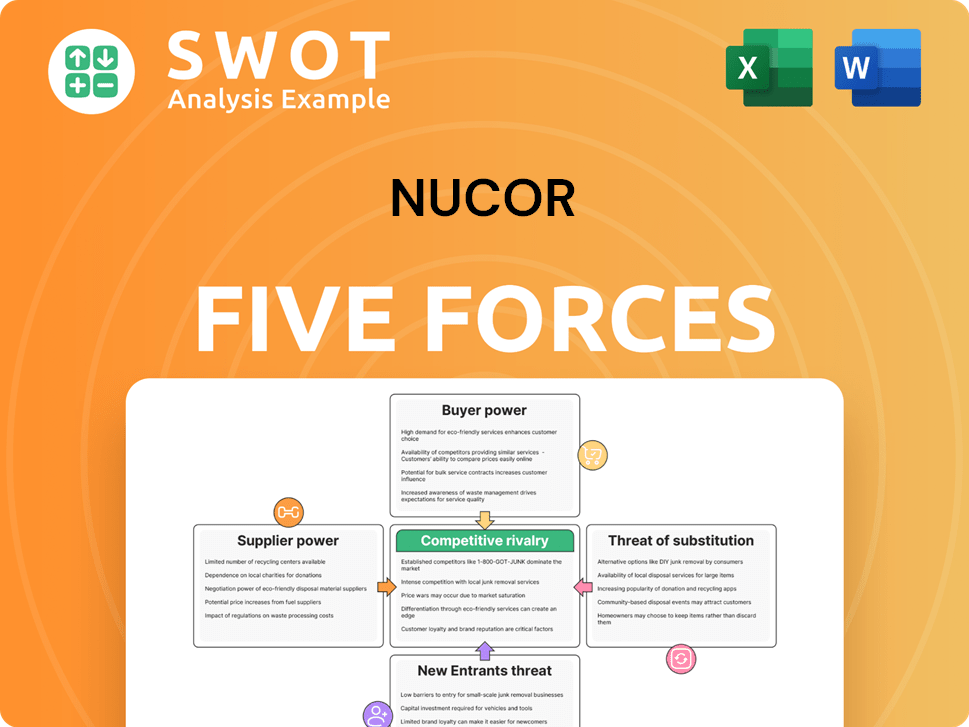
Related Blogs
- What are Mission Vision & Core Values of Nucor Company?
- What is Competitive Landscape of Nucor Company?
- What is Growth Strategy and Future Prospects of Nucor Company?
- How Does Nucor Company Work?
- What is Sales and Marketing Strategy of Nucor Company?
- What is Brief History of Nucor Company?
- What is Customer Demographics and Target Market of Nucor Company?
Disclaimer
All information, articles, and product details provided on this website are for general informational and educational purposes only. We do not claim any ownership over, nor do we intend to infringe upon, any trademarks, copyrights, logos, brand names, or other intellectual property mentioned or depicted on this site. Such intellectual property remains the property of its respective owners, and any references here are made solely for identification or informational purposes, without implying any affiliation, endorsement, or partnership.
We make no representations or warranties, express or implied, regarding the accuracy, completeness, or suitability of any content or products presented. Nothing on this website should be construed as legal, tax, investment, financial, medical, or other professional advice. In addition, no part of this site—including articles or product references—constitutes a solicitation, recommendation, endorsement, advertisement, or offer to buy or sell any securities, franchises, or other financial instruments, particularly in jurisdictions where such activity would be unlawful.
All content is of a general nature and may not address the specific circumstances of any individual or entity. It is not a substitute for professional advice or services. Any actions you take based on the information provided here are strictly at your own risk. You accept full responsibility for any decisions or outcomes arising from your use of this website and agree to release us from any liability in connection with your use of, or reliance upon, the content or products found herein.